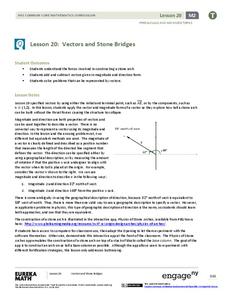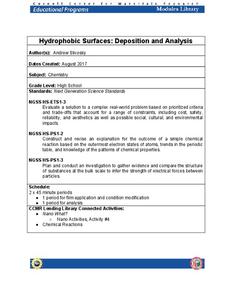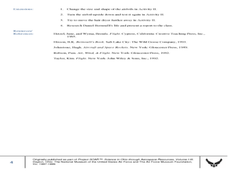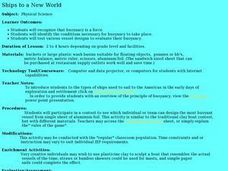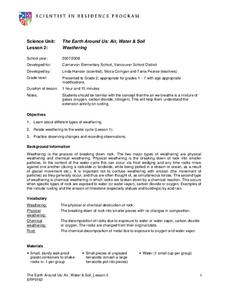EngageNY
Vectors and Stone Bridges
What does it take to build a stable arch? Pupils apply vectors and physics as they examine arched bridges and their structural integrity. They use vectors to represent the forces acting on the stone sections and make conclusions based on...
Florida International University
Designing an Autonomous Underwater Vehicle (AUV): Concepts in Lift, Drag, Thrust, Energy, Power, Mass, and Buoyancy
Engineer an autonomous underwater vehicle (AUV) to study concepts of physics. Using household materials, collaborative groups design and build an AUV and then test Newton's Laws of Motion as they apply them in underwater environments...
Calvin Crest Outdoor School
Survival
Equip young campers with important survival knowledge with a set of engaging lessons. Teammates work together to complete three outdoor activities, which include building a shelter, starting a campfire, and finding directions in the...
Curated OER
Water Pressure Blaster
Third graders complete an experiment to introduce them to the concept of water pressure. In this water pressure lesson plan, 3rd graders create pressure in a water bottle and observe the force of water that is created.
Science Matters
Motors
It's time to get moving! The 13th lesson in a 14-part unit on electricity and magnetism explores the relationship between electricity and mechanical energy. Budding scientists build motors and experiment with different components to...
Institute of Electrical and Electronics Engineers
Rotational Equilibrium
Physics stars design mobiles that demonstrate rotational equilibrium. They take measurements and solve related equations for force by graphing, substitution, or determinants. This is a well-developed lesson plan, complete with student...
Curated OER
Playing With Science
Young scientists investigate the scientific concepts and principles that help make common toys such as hula hoops, yo-yos, slinkies, and silly putty work. As a class, they read "Backyard Rocket Science, Served Wet" to get a look behind...
Cornell University
Hydrophobic Surfaces—Deposition and Analysis
Couches, carpets, and even computer keyboards now advertise they are spill-resistant, but what does that mean? Scholars use physical and chemical methods to coat surfaces with thin films to test their hydrophobic properties. Then they...
PHET
Planet Designer: Retro Planet Red
What does the atmosphere on Mars look like? This fourth instructional activity in the series of five is designed for high schoolers. Scholars apply previous knowledge to add atmosphere to Mars in an online simulation. This comprehensive...
Curated OER
Why Be Active?
What are some of the benefits of physical activity? Young learners take a look at not just the physical benefits, but also the emotional and social benefits of being physically active. There is a heart rate activity to count their...
Curated OER
Chemical and Physical Changes
Eighth graders investigate different gas behaviors. In this chemistry activity, 8th graders describe how changing volume and temperature affect gas particles motion. They collect data and make a generalization about these variables'...
Curated OER
Force and Gliders
Students explore physics by creating data graphs in class. In this flight properties instructional activity, students read the book Flying Machine and identify the force, resistance and construction necessary to keep a glider in the air....
Curated OER
Superball Physics
Eighth graders bounce superballs and measure to see if they can hit the same spot over and over. In this superball lesson plan, 8th graders calculate the weight of the ball with the force of the throw to try and hit the same spot with...
Curated OER
Look Mom, No Wings!
Learners explain how drag, weight, lift and thrust work together to make something fly. In this physics lesson, students measure their jump height and record data on the table. They reason out why they can't remain airborne for long.
Curated OER
Vectors
Young scholars are introduced to the bridge building challenge. They perform two labs and work in small groups to finish the vector worksheet. Students review vector additions. They then move onto the Forces on an Inclined Plane Lab. ...
Curated OER
NEWTON'S 3RD LAW
High schoolers examine the formal definition of Newton's 3rd law: "forces always originate in pairs, equal in magnitude and opposite in direction." --The informal, qualitative version: "Each action has an equal and opposite reaction."
Curated OER
An Uplifting Experience
Fifth graders conduct flight experiments. In this uplifting experience lesson, 5th graders build an airfoil and place in a variety of conditions to observe the results of lift and force in flight, as well as angle of attack....
Curated OER
Animation Flip Books
Young scholars investigate examples of animation made from a flipbook technique in order to learn how to create their own flipbook and to learn how this process looks like an animated cartoon. In this animation lesson, students will...
Curated OER
Ships to a New World
Students experiment with buoyancy as a force. In this buoyancy lesson, students access an assigned website to examine the sailing vessels that came to the New World. They work as teams to build boats out of aluminum foil to see which...
Curated OER
Weathering
Second graders explore weathering and how the water cycle plays a part in weathering. In this weathering activity, 2nd graders put gravel and sugar cubes in a jar and shake, simulating weathering. Students use the scientific method...
Curated OER
Pendulums on the Moon
Students conduct experiments to determine if length, mass, or starting angle has any effect on the rate of a pendulum's swing. They also conduct an experiment online to determine if gravitational force plays a role in the swing. Groups...
Curated OER
Chemical Bonding
Students classify compounds as ionic or covalent. In this chemical bonding lesson plan, students experiment with 6 chemical compounds. They test physical properties such as the melting point, the solubility and the electrical...
Curated OER
Power in the Tubes
Eighth graders investigate the relationship between force, distance and time. In this physical science lesson students compute the work done, graph and find the relationship between work and power.
Curated OER
Ar.... What Gives?
Learners investigate the properties of air through inflated objects. In this physical science lesson, students examine gas as a state of matter. Student push on inflated objects and note the space the gas has taken up inside. Learners...


